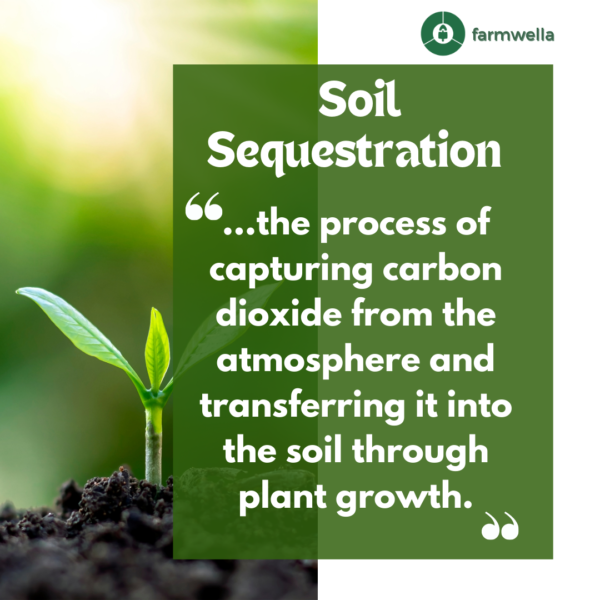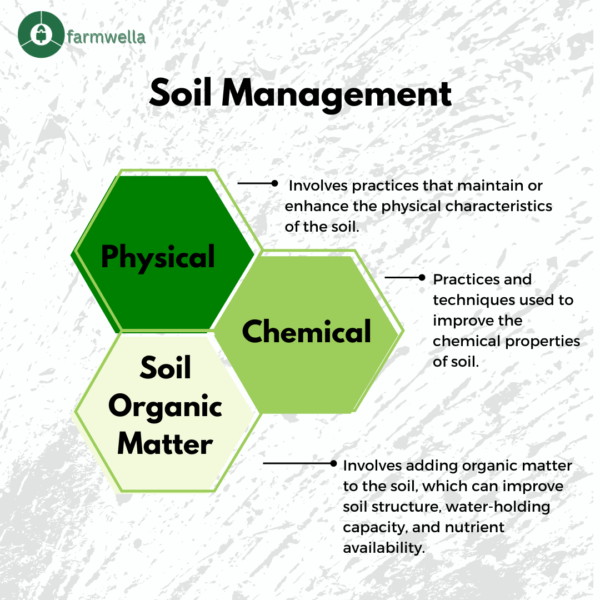Franklin D. Roosevelt once said, “The nation that destroys its soil destroys itself.” He’s spot-on with this one. I mean, every farmer out there knows this to be true, right? Soil health is crucial to our farming success. After all, the soil serves as the foundation for crop growth, and its health directly impacts its quality and yield.
Neglecting soil health can lead to soil degradation, which is costly to remediate and can cause reduced yields. Therefore, farmers must pay close attention to soil health to avoid these negative outcomes.

In this article, we’re going to outline why it’s super important for farmers to focus on soil health. We’ll cover five big reasons why taking care of the soil can have major benefits for the farm. So let’s get started!
1. Enhanced Soil Conservation
Soil conservation is vital for the long-term sustainability of farming. Soil erosion, loss of soil structure, and compaction can all contribute to soil degradation, which can make it harder for soil to support plant growth.
To combat this, farmers can work on improving soil health. Healthy soil is key for soil conservation because it can help prevent soil erosion, improve soil structure, and reduce soil compaction, all of which help to conserve the soil.
One way farmers can improve soil health is by using cover crops, such as legumes or grasses. Cover crops protect the soil from erosion by providing a layer of protection against the elements, and their root systems help to improve soil structure and increase organic matter content. This means better soil for growing crops and a more sustainable future for agriculture.
It’s really important to reduce soil compaction if we want to conserve our soil. When soil is compacted, it can’t reduce water infiltration, which can lead to increased runoff and erosion.
2. Improved Crop Yields
One of the main reasons why soil health is incredibly important for farming is because it directly affects crop yields. When soil is healthy, it provides essential nutrients, promotes root growth, and helps keep moisture in the soil, all of which are critical for plants to grow and produce crops.
In fact, the soil is the primary source of nutrients for plants, so if the soil’s health is compromised, it can negatively impact plant growth and ultimately reduce crop yields.
For instance, if the soil is lacking essential nutrients like nitrogen, phosphorus, and potassium, crops will have a hard time growing, and this can result in lower yields.
Additionally, insufficient organic matter can also hinder root growth. As a result, plants may not be able to absorb nutrients and water efficiently, leading to lower yields.
The good news is that farmers can improve crop yields and produce healthier, more abundant crops by paying close attention to soil health. Factors like soil structure, organic matter content, pH levels, and nutrient availability can all impact soil health. By maintaining a healthy balance of these factors, farmers can create an optimal growing environment for their crops.
3. Reduced Inputs and Costs
Another major perk is that it can actually reduce the need for inputs like fertilizers, pesticides, and irrigation. When soil is healthy, it creates an environment where crops require fewer inputs, which ultimately lowers the cost of production and reduces the environmental impact of farming.
Also, healthy soil has a balanced ecosystem of microbes and beneficial organisms that help to naturally suppress pests and diseases. This means that farmers can use fewer chemical inputs, such as pesticides, which can be harmful to the environment and human health.
Additionally, healthy soil can retain moisture more effectively, which means less need for irrigation. By holding onto more water, crops can stay healthy and hydrated even in dry conditions, without the need for excessive irrigation.
Reducing inputs isn’t just good for the environment, it’s also good for farmers’ wallets. By using less fertilizers, pesticides, and irrigation, farmers can save money in the long run.
4. Improved Climate Resilience
Soil has the ability to capture and store carbon from the atmosphere, which is important in reducing the number of greenhouse gases that contribute to global warming. This process is called carbon sequestration.
Soil sequesters carbon through the presence of soil organic matter, which comes from things like plant residues and animal manure. As this organic matter decomposes, the carbon it contains is released into the soil and stored for long periods of time.
But how can we increase the amount of carbon that is stored in the soil? Well, soil management practices play a big role. For instance, practices like reduced tillage and cover cropping can increase soil organic matter and promote carbon sequestration.
By implementing these practices, farmers can improve soil health and contribute to efforts to combat climate change.

5. Long-term Sustainability
Healthy soil can sustain crops year after year, without the need for expensive inputs or damaging the environment.
By improving soil health, farmers can create a sustainable cycle of nutrient availability, plant growth, and soil fertility. This means that you can produce high-quality crops while reducing their dependence on chemical fertilizers and pesticides. In turn, this can lead to cost savings on inputs, which can help to increase profitability over time.
How Do You Manage Soil Health Effectively
To manage soil nutrients, farmers need to control the amount and method of nutrients applied to the soil. This involves understanding the right amounts of nutrients already present in the soil and the nutrients that the soil lacks. By doing so, you will be able to maximize crop growth and reduce nutrient losses that may harm the soil.
Good soil management practices are essential to maintaining soil health and productivity over time.
So, what practices can you adopt to manage and improve soil health? Let’s dive right in and find out.

Physical Management
- Making beds: This means creating raised beds to avoid compacting the soil. It helps to make the soil porous, which makes it easier for crops to grow.
- Mulch: This is a layer of material placed on top of the soil to keep it moist and reduce soil compaction. There are two types of mulch: organic and inorganic. At Farmwella, we use plastic mulch, which is one of the most commonly used types.
Chemical Management
Applying fertilizers to the soil can feed the crop, but it’s not the most effective way to manage soil nutrients. Fertilizers do not manage soil nutrients adequately, even if they are effective on crops.
Increasing Soil Organic Matter
- Manure: Applying manure to the soil can help boost its organic matter, which is important for managing soil nutrients. Manure can come from animal, human, and plant waste, and they contain complex organic forms of plant nutrients.
- Crop rotation: Planting different crop varieties in different areas throughout the growing season can enrich the soil with additional plant debris and green manures, which helps to retain nutrients in the soil.
Conclusion
Investing in soil health is not only good for the environment, but it is also a smart business decision that can help farmers increase profitability and long-term success. So, whether you are a small-scale farmer or part of a large agricultural operation, paying attention to soil health should be a top priority.
